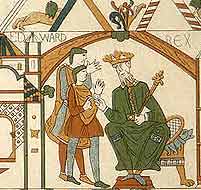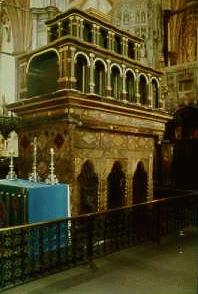'Good King Edward'

Today is the festa of St Edward the Confessor, a feast extended to the Universal Church by Blessed Innocent XI at the recommendation of Philip Cardinal Howard OP, but now sadly only in our local Calendar (grrrr). I should wish my dad a buona festa, since it's his name day.
Most people have heard of St Edward because he built Westminster Abbey and died in the most famous year of English history, 1066. In fact the succession crisis that followed his death led to the battle of Hastings and the death of King Harold.
But there’s more to St Edward than ‘1066 and all that.’ Last year Cardinal Murphy-O'Connor preached a rather good sermon at Westminster Abbey on the occasion of the saint's one thousandth birthday. It's worth reading in full. He pointed out:
Kings in the Middle Ages knew what was expected of them. They had to defeat their enemies in war, and they had to beget sons to ensure the succession of the crown and provide political stability. Edward the Confessor did neither: he fought no battles, and he fathered no children. And partly because of that, after him English rule gave way to foreign conquest. But for more than twenty years Edward ruled as an effective and peaceable king. He took the taxes raised for war and gave some of them at least to the poor, he defused international aggression by negotiation, he tempered harsh laws to human frailty, he made himself available to his subjects, and he built on this site a great monastery dedicated to St Peter.
When Edward built the first minster here in the West, London already had a great minster in the East, its cathedral church of St Paul’s. By dedicating the new West Minster to St Peter, Edward poised his capital and its people between the two great founding Apostles of the Church, and placed the life of London, and of England, under the light of that church’s teaching and witness and wisdom. This was to be no secular city, but a community shaped by Christian faith and hope and love; and the Abbey’s continued presence at the heart of our city is a twitch upon London’s thread, tugging it always back to its heart.We remember St Edward as a man of faith, who faced adversity with a strong trust in providence, exercised an extraordinary piety and was generous to the poor. According to legend, he gave a ring to a beggar one day at Westminster. Two years later a group of English pilgrims in the Holy Land met an old man, who identified himself to be St John the Beloved Disciple and gave them a ring, saying 'for the love of Edward I will not fail you, and you shall arrive safe and sound in England. Then go to Edward, and say you have brought a ring which he gave to me when I besought him in poor array. And tell him that in six months he shall come to me in Paradise.'

St Edward was buried in his Abbey at Westminster and, because of his royal birth, his shrine survived the Reformation. We celebrate him today not as a great King but as a great Christian. Mgr Ronald Knox hits the nail on the head in the second reading in today’s Office of Readings: we might say rather harshly that ‘when we venerate St Edward, we venerate a failure.’ However,
ask yourself which you would rather have been, in life, of all those great dead who lie in Westminster Abbey, and you will find it a difficult question to answer: there is so much that dazzles, so much that captures the imagination…but ask yourself which of those great dead you would rather be now, your body there, your soul far away – is there any Christian who would not ask to change places with the Confessor, who would not choose his resting-place, there to wait for the opening of the great Doomsday Book?



1 Comments:
What is the connection with the British blogs? I am so grateful for your posts. How very Catholic!
Post a Comment
<< Home